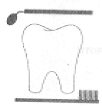Dental Management of Adult Patients with Haemophilia and Other Congenital
Bleeding Disorders
Guidance
(pdf) leaflet to print out and hand to your patients
Scottish Oral Health Group for Medically Compromised Patients
| PATIENTS WITH SEVERE AND MODERATE
DISEASE |
 |
|
 |
Dentate Patients |
|
Edentulous Patients |
 |
|
 |
Treatment in hospital or by arrangement with the
Haemophilia Centre |
|
Treatment may be carried out in General Dental
Practice or Community Dental Service |
| |
PATIENTS WITH MILD AND CARRIER STATUS
Patients are managed on a shared care basis with the hospital service. |
| |
 |
| |
Prevention and Hygiene Therapy |
| |
 |
 |
| |
|
Extractions and Surgery |
Restorative Dentistry |
|
| |
 |
|
 |
Dentures and treatment without L.A. |
Buccal infiltration
Intra-papillary injection
Intraligamentary injection |
|
Inferior dental block
Lingual Infiltration |
 |
 |
|
 |
General Dental Practice or Community Dental Service |
Treatment in hospital or by arrangement with Haemophilia
Centre |
| |
Guidance
for Dental Practitioners |
 |
The Dental Management of Adult Patients with Haemophilia
and Other Congenital Bleeding Disorders
Scottish Oral Health Group for Medically Compromised
Patients
All patients with haemophilia and other congenital bleeding disorders
are registered with a haemophilia centre and are advised to see a dentist
every six months if they have any of their own teeth and every two years
if they are wearing complete dentures. They will be reviewed in the hospital
dental department every two years as part of their ongoing medical care.
It is not necessary for this to be carried out by the hospital-based service
for all patients:
o All moderate and severely affected patients should receive all their
dental treatment in the hospital environment. In special circumstances
treatment may be provided by the Community Dental Service providing there
is close liaison with the haemophilia centre.
o All other patients can have the majority of their treatment provided
by either the General Dental Service or the Community Dental Service,
with appropriate liaison with the local haemophilia centre.
Individuals are at risk from conditions affecting both hard and soft-tissues.
The management of dental disease may require the use of intravenous clotting
factor concentrates and therefore prevention is of the utmost importance.
The commonest diseases are periodontal disease, dental caries, and tooth
wear.
Routine
Dental Examinations |
A thorough medical and dental history and comprehensive examination are
the basis of good preventative care and should be an essential component
of the dental care of all patients with a congenital bleeding disorder.
The guidance refers to those with mild haemophilia and carriers who may
be treated in either the general or community dental services.
|
o Prevention Advice
Preventive advice should be reinforced at each visit.
It should include dietary information and the use of fluoride
toothpaste and supplements where appropriate. |
o Hygiene Therapy
It is very unlikely that a routine scale and polish including the
use of ultrasonic scaling will cause any prolonged bleeding. However,
if the gingival and periodontal condition is very poor cover may
be required to control bleeding. |
|
o Removable Prosthetics
Treatment is unlikely to cause any problems. |
o Orthodontic Treatment
Fixed and removable orthodontic appliances may be used along with
regular preventive advice and hygiene therapy. |
o Restorative Dentistry
Restorative dentistry, including the provision of crowns and bridges,
can be carried out safely provided the local anaesthetic guidelines
are followed (below). |
|
o Endodontics
This should not cause problems although there is sometimes some
bleeding at the apical foramen where vital pulp is present. This
may continue to bleed for some time and cause pain. The use of sodium
hypochlorite for irrigation and calcium hydroxide paste as the canal
medicament appears to reduce this problem. |
o Extractions and Surgery
In most cases this will have to be carried out in the hospital environment
to allow the administration of the appropriate cover and immediate
post operative care. The haemophilia centre will confirm this. |
|
Intravenous coagulation factor concentrates are usually only required
when an inferior dental nerve block or a lingual infiltration is required.
The requirement for such cover may alter depending on the proposed dental
treatment. It is essential that information on both the treatment and
the anaesthetic technique is given to the haemophilia centre so that they
can assess the requirements for cover.
Local anaesthetic techniques
buccal infiltration ~ no cover required
These can be used for anaesthetising all upper teeth and also the buccal
aspects of lower premolars, canines, and incisors. The use of Articaine
may be considered for lower teeth.
Intra-Papillary injections
No cover required
These may be used for anaesthetising any teeth.
Intraligamentary injections
No cover required
The use of these injections should not cause any problems in patients
with congenital bleeding disorders. It is not a technique that is in common
use as there is a slight risk of bleeding into the periodontal ligament,
resulting in severe pain.
Inferior Dental Block ~ Cover Required
The inferior alveolar nerve block should only be required for treating
the mandibular molar teeth. If it is required the patient may require
appropriate cover by the haemophilia unit.
Lingual Infiltration ~ Cover Required
If a lingual infiltration is required the patient must have the appropriate
cover.
Scottish Haemophilia Centres |





